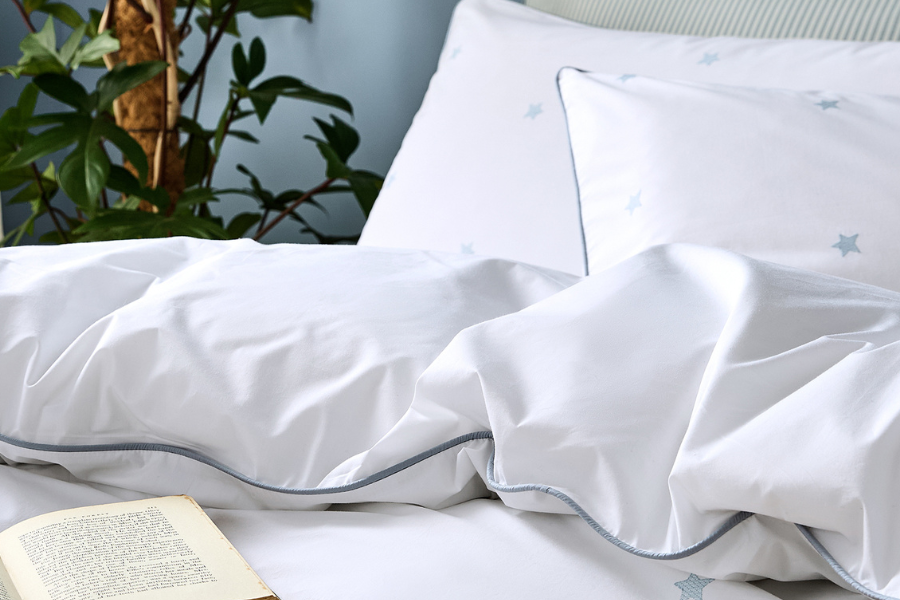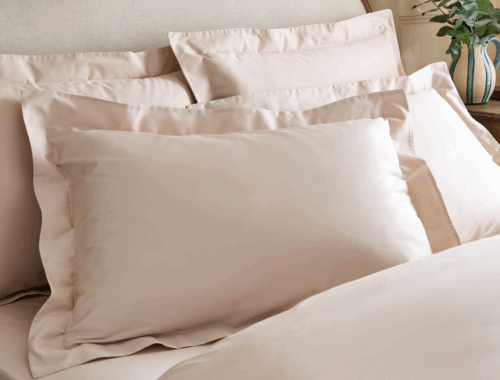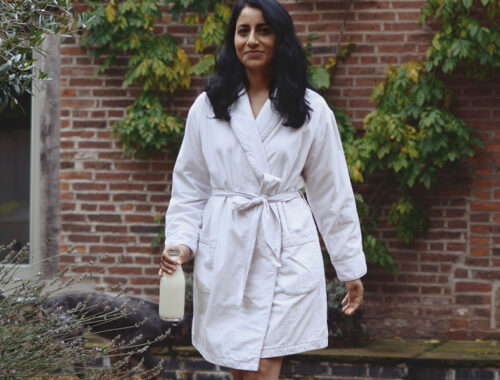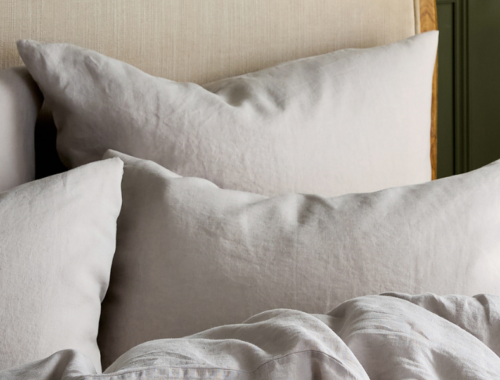
expert cotton care: how to wash your organic cotton bedding
Ahhh, is there anything quite like sinking into fresh cotton bedding after a long day? Ensure your organic cotton sheets look their absolute best and help you sleep soundly year after year—whilst simultaneously lowering your energy bills and reducing your carbon footprint—with these small but impactful tips. A little care and attention goes a (very) long way!
how often?
Generally, washing once a fortnight should ensure you get that fresh sheet feeling night after night. Although, as there are so many different circumstances that determine this one, we can’t decide for you. For example, if you’re a hot sleeper or during the summer months, you may want to wash your bedding more regularly.
Disclaimer: Having two bedding sets means that you never have to be without nightly doses of much needed comfort on laundry days!
washing temperature
And what’s best – you don’t need a hot wash to get a really good clean, as your Dip & Doze organic cotton bedding fabric is able to wash easy. So, if the thought of germs makes you restless, remember advanced detergents work wonders.
So, we suggest washing at 40 ºc, and maybe even 30 ºc with a non-bio detergent if your bedding isn’t too dirty. All in the name of stainability kudos, 30°C actually uses 38% less energy than washing at 40°C. We do recommend avoiding the quick wash cycle on your machine, though, as this won’t give the detergent enough time to work well.
detergents we recommend using
You’ve consciously chosen or shown interest in organic cotton bedding, so kudos to you! But why stop there? While conventional detergents are some of the most toxic, fragranced, dirty cleaning products out there, there are lots of healthy alternatives that are sure to wash your bedding well. We recommend gentler, non-bio detergents to reduce skin irritation.
Many of us are guilty of over-using detergent in our washes when we want to give our favourite go-to bedding a really good clean. And although your Dip & Doze bedding washes well, using too much detergent makes it harder to remove during the rinse cycle. It isn’t an exact science. For example, you’ll need a little more detergent if you live in a hard water area than a soft water area. You may also need a little more for a particularly dirty load. But as a general rule, we recommend following the manufacturers guidelines, until you’re used to a particular brand, when you can adjust accordingly.
fabric softener
If you’re using fabric softener, remember very little goes a very long way. You really don’t need much! Organic cotton softens naturally over time. If you iron your sheets, however, a little softener will protect the fibres from the heat.
separation
White cotton easily picks up other colours. Keep your white sheets beautifully white by not washing them with any other colours. Discover our complete guide on how to keep your white bedding white here!
Worried about your striped duvet covers? No need to toss and turn. Our stripes are yard dyed, meaning they’re colour fast and won’t leak. Just be sure to wash with other light colours to be safe from damage.
button it up
Avoid a tangled bundle of sheets and pillowcases at the end of your cycle by always buttoning up your duvet cover beforehand. Our natural button closures are perfect for staying fastened around the drum, so your bedding can get the best clean.
Be sure not to mix your load with items that might snag your bedding like zippers and bras, though, as your bedding might not respond well to these.
give them space
Ensure you don’t fill your machine over three quarters full so the detergent and softener can effectively rinse out, helping prevent prominent creases in your organic cotton bedding.
top tips for drying
Another easy breezy way to avoid creases setting into your sheets is by removing them from the washing machine as quickly as possible.
We advise trying to avoid the tumble dryer whenever possible. However, if you need a helping hand during the winter months, try to do so on a low heat setting.
Another little tip if you’re using your tumble dryer is to remove your bedding while it’s still warm and just before it’s completely dry. Do this last bit of drying naturally (hang them over a banister, put them on the line if the suns shining or lay them flat on your bed) and it’s like doing a touch of ironing without the hassle! Don’t be shy to use your washing line even if it’s not summer. All you need is a slight breeze on a dry day.
to iron or not to iron
Do you love it or loathe it? If it’s the latter, we get you. It can be time consuming. What’s more, we find there’s something wonderfully soothing about sinking into the natural wrinkles of bedding. However, if you do find comfort in immaculate sheets, it’s perfectly safe to iron your organic cotton bedding.
Top tip for keeping your Dip & Doze as neat as can be? Iron your bedding while it’s still a little damp (but not wet) using the cotton heat setting. This will make achieving perfectly crisp bed linen so much easier. We find adding a glass of vino makes time spent ironing go by so much quicker, too!
breakfast in bed mishaps
Act fast! You may have just climbed back into bed with your hot tea on a Sunday morning and the last thing you want to do is put a wash on, but this is our top tip for rescuing your sheets. Apply stain remover directly to the stain (ensuring it doesn’t contain any bleach if you have coloured bedding). If you don’t have any stain remover to hand, you can spot clean by adding a little laundry detergent or washing up liquid to the stain.
And there you have it. Love your bedding and it’ll love you back for years to come, remaining tip top quality – something that is hard to find in bed linen nowadays. Shop organic & Fairtrade, lovingly made bed linen.
You May Also Like

how often to change your organic cotton pillowcases
April 16, 2025
how to care for your robes
May 20, 2022


